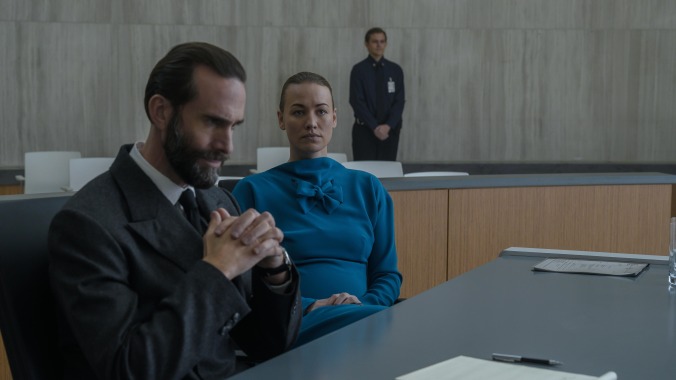From my extremely limited understanding of Emmy eligibility rules, “Testimony” falls under the “hanging episodes” rule that states that episodes aired after the May 31 deadline can still be considered as long as the screeners were available before that date. Which is great news for the cast of The Handmaid’s Tale because this is clearly the Emmy clip episode—especially for Elisabeth Moss, who has been treating this season like a greatest hits montage.
We have another banger on our hands in a very strong season of the most emotionally exhausting show on my rotation. Even Mare Of Easttown feels like a respite, thanks to all the vaping and Jean Smart’s antics. Still, even though I would probably hide from June if I were to encounter her on the mean streets of Toronto, I’m not the kind of viewer that bails on a show because the protagonist fails the moral rectitude test. I appreciate that the writers are forcing us to journey into this dark, dark, dark spiritual hell where we have to grapple with difficult questions. For example: Healing after trauma—should it involve the law of retaliation or does a gratitude journal suffice?
Whatever the answer may be, there is one generous consensus: reclaiming your narrative via (GASP!) testimony is a necessary first step. We bear witness to the many ways the victims of Gilead attempt to do this. There’s the Moira-led group therapy, where former Handmaids share the ways they’re coping–or not. There are the written statements presented to the court against the Waterfords. I would even say there’s the idea of compartmentalization, best exemplified by Moira who prefers to focus her energy on other topics of convo in the home.
The victims of Gilead are not the only ones, though, who want to speak their truth. There is the mysterious Iris/Irene, a former aunt who hounds Emily in the hopes she can explain her side of the story. The Waterfords too are prepped to the nines for their charges hearing. Serena, whose wholehearted belief in Gilead’s mission has been waning, might be dressed in her wifey best but believes that showing some deference towards the victims might be the right strategy. Fred, however, prefers to double down on the crazy, as we later see in the hearing.
But obviously the biggest testimony of all is June’s. She has cut her hair short, in the ancient female tradition of New Me, New Do. She is dressed like an Elizabeth Warren campaign staffer at the height of the race. She is ready to spit on a Bible if the Canadian court so much as hints at it, but it’s Canada and the court is as spotless as it is secular. She is not ready to make nice, she is not ready to back down, she is still mad as hell and she doesn’t have time to go ’round and ’round and ’round.
Her whole monologue is a sight to behold. First off, thank you for the massive recap of everything that happened to her since season one, ’cause I sure needed that refresher. There is even a nod to the 247 opportunities she had to escape Gilead, so at least there is an awareness that this was a CONSTANT theme. But beyond the info dump, every little expression, gesture, twitch on Moss’ face is its own discourse. The proud smile when she talks about hitting the Commander back. The restrained sadness as she memorializes Mrs. Lawrence. Breaking the fourth wall when she says, “I am grateful to be speaking to you today,” as if it were a very sincere PSA for a violence against women awareness campaign.
But if sharing one’s story were enough, then LiveJournal accounts would have replaced therapy a long time ago. What June is looking for, and what most Gilead victims want, is more. They want to dismantle the whole state. They seek accountability from those who have harmed them. Fuck accountability, many want outright retribution. And June, well, she is embodying the Elmo Rise gif in all its messy, problematic, unsettling glory.
In case the testimony wasn’t enough to put us in June’s side, despite all the AWFULNESS of her past actions (#freeluke), we also take a brief visit back to Gilead. Whose interiors, always looks like a cross between Grey Gardens and Northanger Abbey. Aunt Lydia is in trouble with Commander Lawrence because she has just been a bit too trigger-happy with that taser of hers. She is doing her best Blue Lives Matter impersonation during training, tasing Handmaids even if they are obedient and the other Boss Aunts despite their position of power. Lawrence is like, “Girl, listen, you need a new hobby” and offers one up to her: Janine.
Yup, Janine lives. But you almost wish that wasn’t the case. Broken down physically and emotionally, she begs Aunt Lydia to not turn her into a Handmaid again. The thing is sharing your story does jack if the person doesn’t want to listen—and Aunt Lydia does not. Still on her own pathological hunt for June, Aunt Lydia insists that it’s June’s corrosive influence that Janine is responding to. Clearly, Janine has every single valid reason to not want to be ritually raped by some religious freaks. June might only be a bleep factoring in that desire. But damn if Lydia doesn’t point to June’s very real ability to sway others, to become a leader wherever she may be. When she is at her best, we get the Angel Flight. When she is at her worst, we get a child assassin.
When she is in Canada, we get a freaking wild card. Tempered, levelheaded Emily reveals during group therapy that she is gleeful over Irene’s death. She hopes her lack of forgiveness led Iris/Irene to hang herself. The other Handmaids follow suit, voicing all their revenge fantasies. Moira tries to regain control of the group, insisting that living in anger isn’t the answer. But June asks, “Why does healing have to be the only goal? Why can’t we be as furious as we feel? Do we have that right?”
This is a very valid question and I’m sure mental health professionals and Rebecca Traister would answer that anger is fantastic, but it should be directed towards something constructive. June, though, is in pure destruction mode. Not only that, she won’t be satiated until others go down that path as well. Will this catch up with her? Will June ever be held accountable for her very real transgressions against the victims she has created?
Moira, the moral compass of the show, insists that we’re all better than the things we’ve done. This is an admirable sentiment to aspire to. But The Handmaid’s Tale holds a bleaker version of humanity, and it appears to be steering us to this: We all have our shadow selves and to resist them after all that trauma is difficult. Some would even say impossible.
Stray observations
- We should all be listening to more Portishead.
- Eyebrow Watch 2021: June paints him as another victim of Gilead in her testimony, which made me wonder if he’s being portrayed as another criminal or something murkier abroad.
- Luke: Ugh, poor Luke, who is clearly aware that something very, very, very dark happened that night in the bedroom. He too wants to move forward, wipe the slate clean, but this is not a process that June wants to partake in. I suspect her motive to share with him the last time she saw Hannah is to drag Luke down into that same pit of anger she dwells in.
- Most Canadian Thing to Happen this Week: I wanted to say something cutesy about the court robes but, given the heartbreaking discovery of the remains of 215 indigenous children, we have to confront the fact that Canada has its own shadow self. I mean, the freaks supporting the Waterfords outside the courtroom are not as far-fetched as one would think. There’s a reason Alberta is considered the Texas of Canada and it has nothing to do with their shared appreciation for prairie oysters.


 Keep scrolling for more great stories.
Keep scrolling for more great stories.
